Nigeria’s Gross Domestic Product (GDP) declined to 1.94 per cent in the second quarter (Q2) of 2019.
This slow growth was recorded despite a real growth rate of 5.15 per cent posted by the oil sector (year-on-year) in the Q2 2019.
According to the second-quarter GDP report released by the National Bureau of Statistics (NBS), the GDP figure is 0.16 percentage points lower than the 2.10 per cent recorded in the first quarter of 2019.
The agriculture sector seen in certain quarters as a drag despite government efforts at reviving it, grew by 1.79 per cent in Q2 2019, from 3.17 per cent in Q1 and 2.46 per cent in Q4 2018.
In the report released on Tuesday, the NBS said the 2.01 per cent GDP figure announced in May has been revised to 2.10 per cent.
In the fourth quarter of 2018, the GDP figure was computed at 2.38 per cent.
The oil sector growth indicates an increase of 6.61 per cent points when compared to Q1 2019(revised).
“The sector contributed 8.82 percent to total real GDP in Q2 2019, up from levels recorded in the corresponding period of 2018 but down compared to the preceding quarter.
“In Q2 2019, Nigeria recorded average daily oil production of 1.98 million barrels per day (mbpd), or 7.6 per cent higher than the daily average production of 1.84mbpd recorded in the same quarter of 2018 but slightly less than output recorded in Q1 2019 (1.99mbpd-revised from 1.96 mbpd),” the report read in part.
According to the NBS, the non-oil sector grew by 1.64 per cent in real terms during the reference quarter. This was –0.40 per cent points lower than recorded in the same quarter of 2018, and -0.83 per cent point lower than the first quarter of 2019.
Explaining why the country recorded declining growth, the Managing Director, Chief Economist, Africa and Middle East Global Research at Standard Chartered Bank Ms, Razia Khan said though the Q2 result is a disappointed as it fell below expectations, this weak growth itself is not too much of a surprise.
Agriculture according to her, appears to have been a key factor dragging down non-oil GDP growth, despite an expansion in crop production.
Other sectors of the economy also experienced weakening momentum, following the ‘lift’ provided by elections in Q1 2019.
According to Khan, with Nigeria’s government only inaugurated at the end of May, Q2 represented a lost post-election quarter because nothing significant in terms of policy direction was actually done.
In an e-mail message made available to Nigerian Tribune, Khan said policy certainty will only have crystallised with the eventual appointment of a new cabinet.
ALSO READ: Nigerian bankers set to host over 1,000 global professionals in Abuja
Also, even though the recovery in oil GDP looks promising, given softer oil prices in subsequent quarters, this pace of growth (driven also by output expansion) may not be sustained.
Lastly Khan added, “while the authorities announced a more pro-growth policy stance, with the CBN putting in place measures to encourage bank lending, external pressures, and pressure on the Naira each time we see a risk-off environment globally, highlights the limits to Nigeria’s plans for any sustained monetary stimulus.
“Although oil GDP posted a healthy growth rate (rising 5.2% y/y from a contraction in Q1, likely driven by increased production), this was insufficient to fully offset weak non-oil GDP growth,” she said.
Ultimately, a firmer GDP recovery according to the economist, will require stronger, largely fiscal and/or reform stimulus. Monetary easing alone is unlikely to be sufficient she said.
WATCH TOP VIDEOS FROM NIGERIAN TRIBUNE TV
- Let’s Talk About SELF-AWARENESS
- Is Your Confidence Mistaken for Pride? Let’s talk about it
- Is Etiquette About Perfection…Or Just Not Being Rude?
- Top Psychologist Reveal 3 Signs You’re Struggling With Imposter Syndrome
- Do You Pick Up Work-Related Calls at Midnight or Never? Let’s Talk About Boundaries






